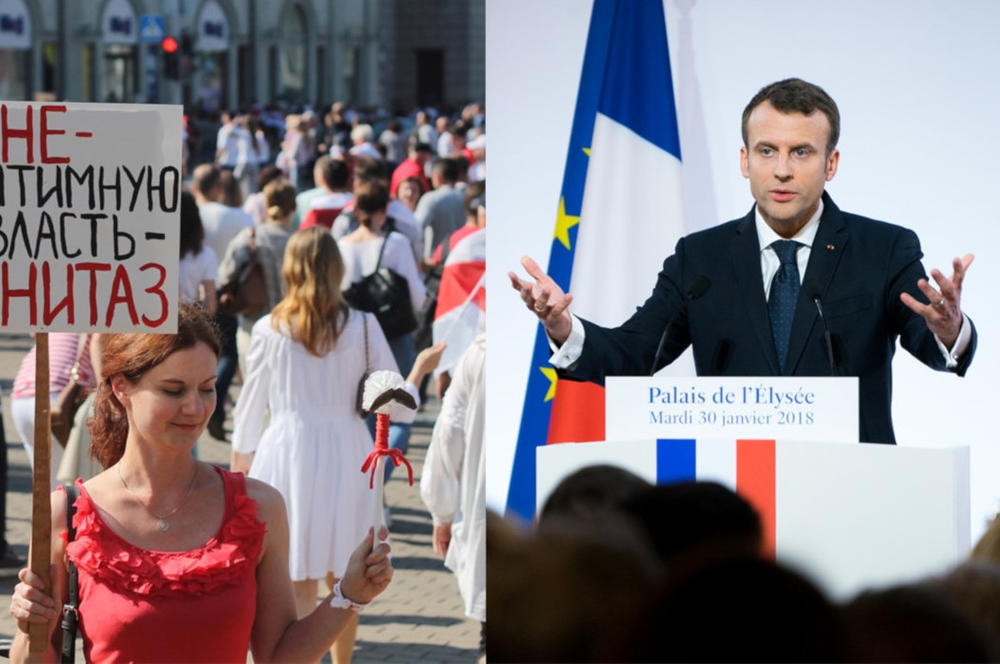The Democracy-Stability Dilemma Revisited
by Judy Dempsey
№ 20/2020 from Dec 15, 2020
Judy Dempsey
The liberal order is pulled between defending human rights on the one hand and interests on the other. Belarus and France shows how both countries have different perceptions about how to reconcile both.
Protesters in Belarus, Emmanuel Macron
Image Credit: Natallia Rak, Jacques Paquier (Flickr)
The end of 2020 beckons. What a year!
The Covid-19 pandemic has ravaged economies. The use of a nerve agent on Alexey Navalny, Russia's leading opposition figure almost killed him. The unwillingness of Donald Trump to graciously accept defeat after last November's presidential election is exacerbating the polarization. The destruction of Venezuela's political, social and economic fabric, perpetrated not by natural disasters but by individuals, will take a long time to rebuild. The list could go on and on.
Amid this tumultuous year, two events among many stand out.
The first is the extraordinary persistence and courage of the citizens of Belarus. The second is how French President Emmanuel Macron rolled out the red carpet for his Egyptian counterpart, Abdul Fatah al-Sisi. The former is about protesting for values. The latter is about defending interests.
First to Belarus.
The narrative is well known. Ever since the rigged presidential elections last August in which Alexander Lukashenko claimed victory for the fifth time, Belarussian society has awoken and persisted.
Every Sunday, every Monday, in fact every day, so many people protest. They want the Lukashenko era to end. They want freedom based on new and fair elections. They want an end to the detentions, the torture, the increasing violence by the security forces, the humiliations, the way masked state militias enter people's homes.
It's also about how electricity and water is randomly cut off to cow the local residents into submission and about the absence of any due judicial process or rule of law. Lukashenko refuses to relinquish power. The citizens are protesting for the rule of law. For values. All this is happening in a neighboring country of the European Union.
Collectively, the EU has slapped sanctions on Lukashenko They have had no impact. This kind of soft power has outlived its usefulness. It needs to adapt to the citizens' ambitions and goals. It means pouring in support for social media, for publicly naming those detaining, torturing and ordering these acts of violence. For preparing for the day after. Lithuania has set a a great example.
Lithuanian prosecutors have launched a pre-trial investigation into crimes against humanity under a complaint by a Belarusian citizen, Maksim Kharoshyn. Can't other European governments should adopt similar measures and launch investigations under the principle of universal jurisdiction? Those who perpetrate crimes should be named.
Bellingcat, the online investigative website, has already set a precedent in naming agents from the FSB, the successor to the KGB who are allegedly tied to poisoning Navalny with the nerve agent, novichok.
Lithuania's actions are fundamentally about defending values. And interests. Both are compatible. As a member of the EU and NATO, it is in the country's interests to have secure, democratic and stable neighbors. And in terms of values, it supports the fundamental element that underpins these three elements.
Another EU country has a different way of dealing with values and interests. France.
France's perception of interests and values are intrinsically tied to its revolutionary tradition enshrined in "Liberté, Egalité, Fraternité" that first appeared during 1789. It was written into the 1958 Constitution and is nowadays part of the French national heritage. These are deep, fundamental values. But what about reconciling them with interests?
Consider this. President Emmanuel Macron rolled out in Paris the red carpet for his Egyptian counterpart, Abdel Fattah al-Sisi, on December 7. This was against the background of the widespread abuse of human rights in Egypt. Arbitrary detentions, disappearances, torture, suppression of free speech, of advocacy groups and an independent opposition are the norm.
Macron justified the reception given to Sisi. "I think it is more effective to have a policy of dialogue than a policy of boycott which would reduce the effectiveness of one of our partners in the fight against terrorism and for regional stability," he said.
Making human rights a major issue would be both "ineffective on the subject of human rights and counter-productive in the fight against terrorism, that's why I won't do it," Macron added. That is Macron's leitmotiv: fighting terrorism whose destruction has caused so many deaths in France over the years. Protecting citizens is a value.
Macron is not alone in his policy towards Egypt. No EU member state is talking about boycott or considering stopping arms exports to Egypt. Their interests are about having Sisi deal, on his terms with what he alleges is the Islamist terrorist threat. But what about values and the rule of law? Can't the two find some way to coexist?
Which EU member state is providing legal aid to those detained without trail, or even demanding investigations. By using the Islamist threat, Sisi he also stamping down on many civil society movements or activists. This is a boiler that is simmering and will one day explode. Remember the Arab Spring? That was when most EU governments supported the former Mubarek regime instead of fostering some kind of dialogue between the (few) independent civil society organisations and the regime?
For most EU governments, stability was more important than values, something the EU, rhetorically prides itself upon. Supporting stability based on hard power carries a high price. Belarus and Egypt prove this in their very different ways. Whatever the outcome, the liberal order's reputation, with some exceptions, is not stellar.
The author is Nonresident Senior Fellow, Carnegie Europe
and Editor in chief of Strategic Europe

